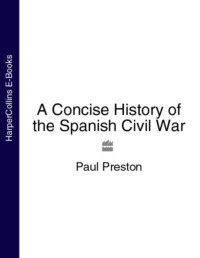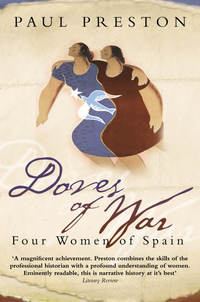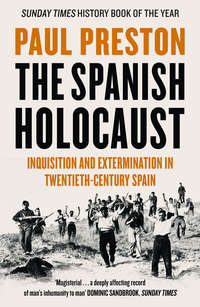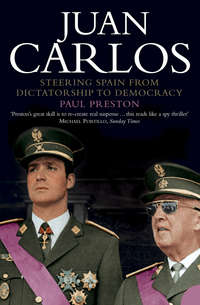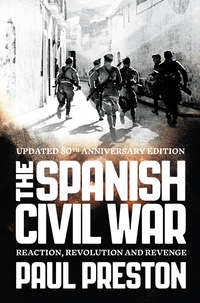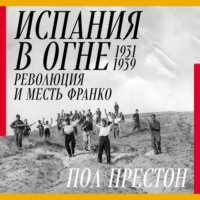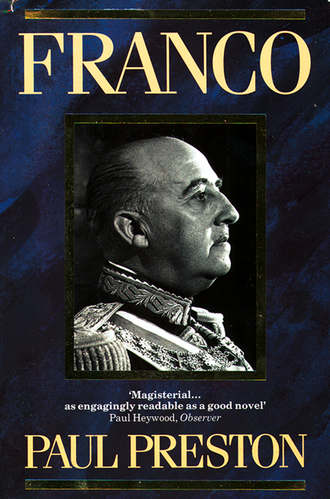
Полная версия
Franco
The difficulties that were now slowing down the advance of the African columns impelled Franco’s Italian and German allies to step up their assistance. On 27 August, accompanied by Lieutenant-Colonel Walter Warlimont of the War Ministry staff, Canaris met Roatta in Rome to co-ordinate their views on the scale and nature of future assistance from Italy and Germany to the Nationalists. At a further meeting on the following day, they were joined by Ciano. Canaris again insisted that assistance be provided ‘only to General Franco, because he holds the supreme command of operations’. Joint Italo-German planning required a recognizable overall Nationalist commander with whom to communicate.5
Talavera was encircled by the three columns. The propaganda value for the Nationalists of the massacre at Badajoz was revealed when large numbers of militiamen fled in buses ‘like a crowd after a football match’. The town fell on 3 September. Another savage and systematic massacre ensued.6 While Franco’s forces had been moving through Extremadura and into New Castile, Mola had begun an attack on the Basque province of Guipúzcoa to cut the province off from France. Irún and San Sebastián were attacked daily by Italian bombers and bombarded by the Nationalist fleet. Irún’s poorly armed and untrained militia defenders fought bravely but were overwhelmed on 3 September. San Sebastián fell on 12 September. It was a key victory for the Nationalists. Guipúzcoa was a rich agrarian province which also contained important heavy industries. The Nationalist zone was now united in a single block from the Pyrenees through Castille and western Spain to the far south. The Republican provinces of Vizcaya, Santander and Asturias were isolated, able to communicate with the rest of the Republic only by sea or air.7
The losses of Talavera and Irún provoked the fall of the government of José Giral. A cabinet which more clearly reflected the working class bases of the Republic was introduced under the leadership of Francisco Largo Caballero. The clearer definition of the Republic and its move towards a stronger central authority was the corollary of the ever fiercer resistance being mounted against Franco’s advancing columns. The reduction of political indecision on the Republican side intensified the feeling among the senior Nationalist commanders that a unified command was an urgent necessity. Franco’s ambitions could be deduced from a statement to the Germans in Morocco that he wished ‘to be looked upon not only as the saviour of Spain but also as the saviour of Europe from the spread of Communism’.8 Now, the issue of a single command opened an opportunity for him. Mola flew to Cáceres on 29 August and discussed the matter with him.9
In the meanwhile, the bulk of Nationalist success was being chalked up by Franco’s Army of Africa. Protected to the south by the Tagus, Yagüe’s troops secured their northern flank by linking up with Mola’s forces. With the road to Madrid now open, for the next two weeks desperate Republican counter-attacks sought to recapture Talavera, but Franco showed a dogged resolve not to give up an inch of captured ground. Stiffening resistance and Franco’s determination to purge territory of leftists as it was captured account for the slowing down of his advance. In fact, he was on the verge of slowing it down even further by a momentous decision.
Among the issues crowding in on him, Franco gave some thought to the besieged garrisons of Toledo and Santa María de la Cabeza in Jaén. He regularly released his own Douglas DC-2 aircraft and his pilot Captain Haya for missions to both fortresses. On 22 August, he had sent a message to the Alcázar de Toledo promising to bring relief.10 The fortress was still unsuccessfully besieged by Republican militiamen who had wasted time, energy and ammunition in trying to capture this strategically unimportant stronghold. The one thousand Civil Guards and Falangists who had retreated into the Alcázar in the early days of the rising, had taken with them as hostages many women and children, the families of known leftists.11 However, the resistance of the Alcázar was being turned into the great symbol of Nationalist heroism. Subsequently, the reality of the siege would be embroidered beyond recognition, in particular through the famous, and almost certainly apocryphal, story that Moscardó was telephoned and told that, unless he surrendered, his son would be shot.* Naturally, the existence, and subsequent fate, of the hostages was entirely forgotten.12
Franco’s troops took more than two weeks to cover the ground from Talavera to the town of Santa Olalla in the province of Toledo on the road to Madrid.13 On 20 September, Yagüe’s forces captured Santa Olalla and imposed another ‘exemplary punishment’ on the militiamen they captured.14 Maqueda, at the cross-roads where the road divided to go either north to Madrid or east to Toledo, also fell to Yagüe on 21 September. At this point, that is to say after the fall of Maqueda, Franco had to make the decision whether to let the African columns race onto Madrid or else turn eastwards to relieve Toledo. It was a complex decision with political as well as military implications. While Yagüe was capturing Santa Olalla and Maqueda, Franco had been engaged in meetings with the other generals of the Junta de Defensa Nacional to discuss the need for a single Commander-in-Chief for the Nationalist forces. It is immensely difficult to reconstruct in precise detail the where, when, why and how of Franco’s decision but a key is to be found in the role of Yagüe.
On the day after Maqueda fell, an ‘officially’ sick and exhausted Yagüe handed over command to Asensio.15 It has been suggested that Franco’s decision to relieve Yagüe of his command was influenced by Mola’s intense hostility to him.16 It is possible, but highly unlikely, that Franco would have relieved the highly successful Yagüe at the insistence of Mola.* It has also been suggested that Yagüe’s replacement had less to do with his illness than with his opposition to Franco’s decision to interrupt the march on Madrid to relieve the Alcázar de Toledo.17 Either of these possibilities would make sense if, in replacing Yagüe, Franco was punishing him for indiscipline. However, it seems unlikely that Yagüe was in disgrace of any kind since his withdrawal from the front was accompanied by promotion to full colonel and his immediate incorporation into Franco’s close entourage.18 By 22 September, Yagüe was already installed in the Palacio de los Golfines de Arriba, a curious resting place for a man in disgrace.19
There is, however, a third and altogether more likely possibility which fits the facts of Yagüe’s health, his promotion and his activities over the next few weeks. Yagüe’s substitution was made necessary because he had a weak heart consequent on problems with his aorta: he was genuinely exhausted and not really fit for further uninterrupted campaigning. Recognizing Yagüe’s priceless contribution at the head of the African columns, Franco was happy to give him a respite, promote him and use his immense prestige within the Legion for another task, as part of the orchestration of his bid to become Generalísimo. The ever faithful Yagüe, despite his obvious need for rest, threw himself into the job with a gusto which makes it difficult to imagine that there was serious friction between him and Franco.
Franco was fully aware of the possible military consequences of diverting his troops to Toledo. He would lose an unrepeatable chance to sweep onto the Spanish capital before its defences were ready. Both Kindelán and his Chief of Operations, Lieutenant-Colonel Antonio Barroso, warned him that opting to go to Toledo might cost him Madrid. Yagüe’s opposition seems to have been the most outspoken. He reiterated the point made by Franco to Mola in his message of 11 August that the mere proximity of his columns to Madrid would have sent the besieging militiamen racing back to the capital. However, as had happened with Yagüe’s doubts over the crossing of the Straits in early August, his unquestioning faith in Franco brought him round. Franco disagreed with his staff that the delay of a week would undermine his chances of capturing Madrid. Nevertheless, he openly stated that, even if he knew for certain that going to Toledo would lose him the capital, he would still fulfil his promise to liberate the besieged garrison.20 He was more interested in the political benefits of the relief of the Alcázar and to maximise those benefits he needed Yagüe at his side rather than in the field.
As a result of Franco’s decision, there would be a delay from 21 September to 6 October before the march on Madrid could continue. The two weeks were lost by Franco while he took Toledo and was involved in the process of his own political elevation. That delay would constitute the difference between an excellent chance to pluck Madrid easily and having to engage in a lengthy siege as a result of the reorganization of the capital’s defences and the arrival of foreign aid. At precisely this time, the Germans began to voice their impatience with ‘extraordinary’ and ‘incomprehensible’ delays which were permitting the Republican government to receive help from abroad.21 Given that Franco never ceased to complain to his allies about Soviet assistance to the Republic, it is ironic that he should so dramatically have underestimated its impact on the defence of Madrid. In moving his forces to Toledo, Franco gave a higher priority to the inflation of his own political position by means of an emotional victory and a great propagandistic coup than to the early defeat of the Republic. After all, had he moved onto Madrid immediately, he would have done so before his own political position had been irrevocably consolidated. The entire process of choosing a Caudillo would have been delayed. Then the triumph, and therefore the future, would have had to be shared with the other generals of the Junta.
Convinced of Franco’s monarchist good faith, Kindelán had long been urging Franco to raise the question of the need for a single command. Ostensibly at least, Franco showed little interest.22 Since his arrival in Tetuán on 19 July, Franco had been swamped every day by pressing problems. However, in the course of solving them, his self-confidence and ambitions had grown. In addition to organizing a combat Army without the normal logistical and financial support of the State to feed, arm and pay his troops, he had extended his activities into the international arena, acquiring a monopoly of arms and ammunitions deliveries. However, it was only in September as co-ordination with Mola’s forces for the final push on Madrid became likely that a formally recognized Commander-in-Chief became an urgent necessity.
There is no reason to doubt that Franco’s faith in his own abilities had already convinced him that, if there was to be a single command, then he should exercise it. He had long since presented himself to the agents of Berlin and Rome as the effective leader of the Nationalist cause. In early September, the Italian military mission under General Mario Roatta presented its credentials to Franco and thereby conveyed Mussolini’s de facto recognition of his leadership.23 Any scruples which he expressed to Kindelán and Pacón reflected slow-moving prudence rather than modesty. Instinctive caution inclined him to avoid possible failure and humiliation by taking care not to be seen to have sought the post of Commander-in-Chief. A show of hesitation would disarm the jealousy of his rivals.
From the earliest moments of the uprising, Franco had been concerned about political unity within the Nationalist zone. Shocked by the Aladdin’s cave of uniforms and militias which he had encountered on arrival at Seville, he had commented to José María Pemán in mid-August 1936, ‘everyone will have to sacrifice things in the interests of a rigid discipline which should not lend itself to divisions or splinter groups’.24 His interest in establishing overall authority over both the military and political spheres, however, quickened as a result of pressures from the Third Reich.
Herr Messerschmidt, the representative in Spain of the German War Matériel Export Cartel met Franco at the end of August. Messerschmidt’s report concluded ‘It goes without saying that everything must remain concentrated in Franco’s hands so that there may be a leader who can hold everything together’.25 In mid-September, Johannes Bernhardt informed Franco that Berlin was anxious to see him installed as Chief of State. Franco replied cautiously that he had no desire to get mixed up in politics. Bernhardt made it clear that further arms shipments were in doubt unless Berlin had a sovereign chief with whom to negotiate and who could take responsibility for future commitments. Characteristically, Franco did not respond and left Bernhardt to fill the ensuing silence. Bernhardt informed him that he would shortly be travelling to Berlin with Lieutenant-Colonel Walter Warlimont, the head of Hitler’s unofficial military mission, in order to report to the Führer and Göring about the progress of the war. One of the issues that Warlimont would be discussing was the political leadership of Nationalist Spain. The clear implication was that Franco’s favoured position as the exclusive channel for German aid could be endangered unless he could show that his grip on power was unshakeable. Disappointed by the general’s non-committal response, Bernhardt approached Nicolás Franco who undertook to work on his brother. Since Franco was not easily manipulable, Nicolás’s efforts may be supposed to have been confined to underlining that now was an ideal moment to make a bid for power.26
In the meanwhile, Kindelán, Nicolás Franco, Orgaz, Yagüe and Millán Astray formed a kind of political campaign staff committed to ensuring that Franco became first Commander-in-Chief and then Chief of State. It is clear from Kindelán’s own account that this was done with Franco’s knowledge and approval. Not surprisingly, Franco maintained sufficient reserve to enable him to disown their efforts should they have proved unsuccessful. It thus appeared that they were taking the lead although Franco was anything but a passive shuttlecock in their game. Kindelán suggested that a gathering of the Junta de Defensa Nacional together with other senior Nationalist generals be called to resolve the issue. The meeting was convoked at Franco’s request, an initiative which clearly indicated his interest in the single command and his availability as a candidate. The choice of additional generals who were invited was also deeply significant. They were Orgaz, Gil Yuste and Kindelán, all totally committed to Franco and all monarchists. In the wake of Mola’s expulsion of Don Juan, they looked to Franco to hold the fort until victory over the Republic permitted the restoration of the monarchy.
The historic gathering was held on 21 September at the same time as the African columns were taking Maqueda. The meeting took place in a wooden cabin (barracón) at a recently improvised airfield near Salamanca. General Cabanellas was in the chair and the others present were the members of the Junta, Franco, Mola, Queipo de Llano, Dávila, Saliquet, and Colonels Montaner and Moreno Calderón and the three additional generals. During the morning session, three and a half hours went by without Kindelán and Orgaz managing to get a discussion started on the question of a Commander-in-Chief, despite three attempts. There exist no minutes of the meeting, and the only record is constituted by Kindelán’s notes. In those notes, there is no indication that there was any discussion of the decision to interrupt the attack on Madrid in order to relieve the Alcázar at Toledo. At lunch on the estate of Antonio Pérez Tabernero, a bull-breeder, Kindelán and Orgaz decided to overcome the reluctance of their comrades and insisted that the subject be discussed in the afternoon session. Mola surprisingly supported them, saying ‘I believe the single command to be of such interest that if we haven’t named a Generalísimo within a week, I am not going on’. When the discussion was resumed, all showed themselves to be in favour, except Cabanellas, who advocated leadership by a junta or directory.27
The choice was effectively limited to the cuatro generales of the Republican song. The most senior, Cabanellas was not possible. He had rebelled against the Primo de Rivera dictatorship, had been Radical parliamentary deputy for Jaén between 1933 and 1935, and was thought to be a freemason. His role in the 18 July rising was unclear and he had no special standing as a combat general. The next in seniority, Queipo de Llano, had betrayed Alfonso XIII in 1930 and, for that reason and because of his family links with Alcalá Zamora, was considered to have been the beneficiary of favouritism under the Republic. He was also privately despised for the obscene radio broadcasts which he delivered nightly from Seville against the Republic. Mola, the most junior, was somewhat discredited by the initial failures of the rising and by the difficulties faced by his northern forces relative to the spectacular successes of Franco’s Army of Africa. He also knew that he could not match Franco’s contacts with the Germans and Italians.28
When it came to the vote on who should be Generalísimo, the two colonels abstained because of their inferior rank. Kindelán voted first, proposing that the single command be entrusted to Franco. He was followed by Mola, then Orgaz and the others, except Cabanellas who said that he could not take part in an election for a post which he considered unnecessary.29 Although he cannot but have reflected wryly on Franco’s hesitations about joining the rising in June and the first half of July, Mola took his rival’s elevation with good grace. On leaving the meeting, Mola told his adjutants that it had been decided to create the job of Generalísimo. When they asked him if he had been nominated, he replied ‘Me? Why? Franco.’ Mola later told his adjutants that he had proposed the name of Franco as Generalísimo, ‘he is younger than me, has higher rank, is immensely well-liked and is famous abroad’.30 Shortly afterwards, Mola told the monarchist politician Pedro Sainz Rodríguez that he had supported Franco in the power stakes because of his military abilities and the fact that he was likely to get the most votes. However, he made it clear that he regarded Franco’s leadership as transitory and was assuming that he himself would play a major role in moulding the political future after the war.31 Many years later, Queipo de Llano, on criticizing Franco, was asked by the monarchist Eugenio Vegas Latapié why he had voted for him. ‘And who else could we appoint?’, he replied. ‘It couldn’t be Cabanellas. He was a convinced Republican and everyone knew that he was a freemason. Nor could we name Mola because we would have lost the war. And my prestige was seriously impaired.’32 Nonetheless, Queipo made no secret of his dissatisfaction with the decision that had been taken.33
The half-heartedness shown by some of Franco’s peers about his elevation was to have an immediate impact on his conduct of the war. It is impossible to say with total certainty when exactly Franco took the decision to direct his troops towards Toledo. The timing is crucial to any assessment of his motives. His official biographer has claimed, without any proof, that it was before the airfield meeting at which he was elected as Generalísimo. Such a timing would conveniently diminish any suspicion of self-serving about the decision.34 However, the decision became a matter of urgency only after the capture of Maqueda and that did not take place until the early evening of 21 September. The Salamanca meeting started in the morning and Franco and his staff had to make an early start to travel there from Cáceres. In fact, there is little doubt that the decision was taken sometime after the fall of Maqueda and therefore after the meeting of the generals at the airfield.35 Whether taken in the evening of 21 September or later, it was after Franco had been elected Generalísimo. He did not draw up specific orders until three days later.36 Whenever Franco made his decision, which Mola’s secretary described as ‘completely personal’, he did so in a context of knowledge of the events of 21 September.37
The meeting on that day had left him with gnawing doubts about his election as Generalísimo. Behind the near unanimous vote and the expressions of support for Franco could be discerned coolness and hesitations on the part of the other generals. The simple election to the status of primus inter pares was merely a step on the road to absolute power and there was still some distance to go. At the time, it was assumed, even by those involved in his election, that what they were doing was merely guaranteeing the unity of command necessary for victory and putting it temporarily in the hands of the most successful general amongst them.38 The agreement to keep the decision secret until it was formally approved and published by the Junta de Burgos reflected their doubts. It would have been entirely characteristic of Franco to seek to tip the balance by the propaganda coup of the relief of the Alcázar. If that is so, the soundness of his judgement that further efforts were required was confirmed when several days went by and nothing happened about his election being announced formally.
The silence was rightly interpreted by Kindelán as a symptom of the lack of conviction of some of the generals at the meeting. Cabanellas was procrastinating precisely because he feared the implications of dictatorial powers being granted to Franco. In the meanwhile, Nicolás Franco, who had recently arrived in Cáceres from Lisbon, brought the news that the German and Italian envoys to Portugal had told him that their governments wanted to see a single command and preferably in the hands of Franco. Nicolás also used his own recent encounter with Johannes Bernhardt to overcome his brother’s apparent qualms about taking on political responsibilities. The lure of being Head of State, the interlocutor of Hitler and Mussolini, must have been seductive, as Nicolás seems to have perceived. However, even more than with the single command, it could be dangerous to be seen to be bidding for such power. With his customary caution, Franco preferred to let others make the running and wait for the new honour to be thrust upon him.
Accordingly, Kindelán, Nicolás Franco, Yagüe and Millán Astray proposed a further meeting at which the powers of the new Generalísimo would be clearly laid out and a proposal made that the post carried with it the Headship of State. Worried about his brother’s hesitations, Nicolás asked Yagüe to put pressure on him. On 27 September, Yagüe told Franco that if he refused to seek the single command, the Legion would seek another candidate, a prospect which decisively guaranteed that he would seek full powers for himself.39 By the time that such a meeting could take place, Franco would have chalked up the great propaganda victory of the relief of the Alcázar at Toledo.
It has been suggested that Franco’s attitude to the garrison at Toledo was affected by bitter memories of his own inability to help the soldiers trapped at Nador in July 1921 after the disaster of Annual.40 The fact that he had been a cadet at Toledo may also have influenced him but would scarcely have justified the decision to make a strategically secondary objective into the first priority. There is little doubt that the relief of the siege would have appealed to the romantic side of a soldier deeply imbued with the ethos of Beau Geste, all the more so as it could be made into a tale which might have come straight out of the legends of El Cid. However, when so much was at stake, the ruthlessly pragmatic Franco would not have let himself be swayed by such considerations unless there were other advantages to be gained.
In December 1936, he revealed more of the truth than perhaps he intended when he told a Portuguese journalist that ‘we committed a military error and we committed it deliberately. Taking Toledo required diverting our forces from Madrid. For the Spanish Nationalists, Toledo represented a political issue that had to be resolved’.41 Whatever Franco’s motives, his decision did his personal ambitions no harm although it was to have serious consequences for the Nationalist cause. By permitting Madrid to organize its defences, the diversion was to swing the advantage back to the Republic almost as starkly as the crossing of the Straits had given it to the military rebels.


